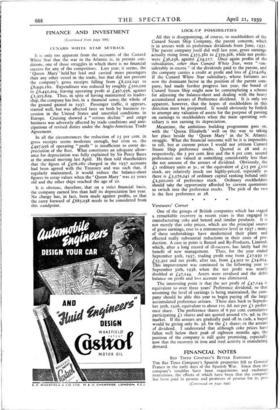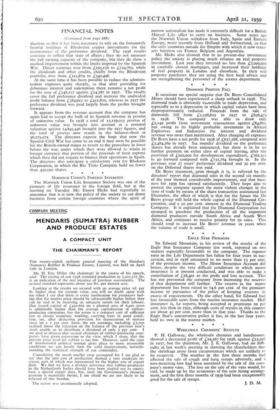FINANCIAL NOTES RIO TINTO COMPANY'S BETTER EARNINGS THE Rio Tinto
Company's Spanish properties fell to General Franco in the early days of the Spanish War. Since then the company's troubles have been requisitions and exchange restrictions, the effects of which have been that the company has been paid in pesetas and promises of pesetas for its pro- (Continued on page 690)
FINANCIAL NOTES
(Continued from page 688)
duction, so that it has been necessary to rely on the fortunately fruitful holdings of Rhodesian copper investments for the maintenance of the preference dividend. The 1938 results continue to reflect that state of affairs ; they do not measure the full earning capacity of the company, but they do show a marked improvement within the limits imposed by the Spanish War. Direct earnings rose from £195,156 to £234,765, while the dividends and other credits, chiefly from the Rhodesian portfolio, rose from £315,879 to £340,496.
At the same time it has been possible to reduce the adminis- tration expenses quite sharply, so that after providing for debenture interest and redemption there remains a net profit for the year of £148,157 against £14,387 in 1937. The results cover the full preference dividend and increase the undivided profit balance from £384,912 to £451,820, whereas in 1937 the preference dividend was paid largely from the profits brought forward.
It appears from the revenue account that the company has again had to accept the bulk of its Spanish revenue in pesetas of unknown value. In 1938 a total of 15,159,025 pesetas of unknown value was brought into account at a nominal valuation against 14,845,446 brought into the 1937 figures, and the total of pesetas now stands in the balance-sheet at 36,275,071. The directors express the hope that now the Spanish Civil War has come to an end it may soon be possible for the British-owned mines to revert to the procedure in force before the war, under which they were allowed to retain in foreign currency that portion of the proceeds of their exports which they did not require to finance their operations in Spain. The directors also anticipate a satisfactory year for Rhokana Corporation, in which the Rio Tinto Company hold no fewer than 450,000 shares.
* * * *











































 Previous page
Previous page